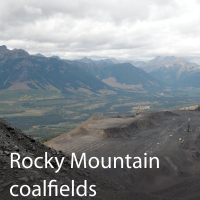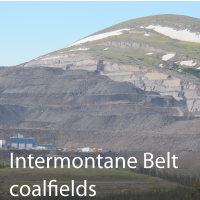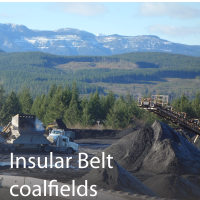Coalfield summaries
Details of the geology, ages, resource estimates, and mining history of British Columbia’s coalfields.
The major producing coalfields in British Columbia are in the Rocky Mountain foothills. In the Peace River coalfield of northeastern British Columbia, three currently active mines produce 1 to 5 million tonnes per year. To the southeast, in the Kootenay coalfields, four current mines produce 25 to 30 million tonnes of saleable coal per year.
Canada’s most significant anthracite deposits are in the Groundhog coalfield of the northwest part of the province. It contains an estimated potential resource of 37 billion tonnes of coal.
The Telkwa coalfield, near Smithers, produced thermal coal for home heating in the first half of the 20th century. The coal is mainly bituminous in rank.
Several small coalfields are in the southern interior of the province. The largest is the Hat Creek deposit, which has proven mineable reserves of about 500 million tonnes of lignite. The Basin mine in the Tulameen area (Similkameen coalfield) has operated intermittently in recent years. Several other small coalfields were mined in the late 1800s to mid-1900s for rail and home heating, but have been inactive for decades.
Two major coalfields are on Vancouver Island. In the late 1800s to middle 1900s, the southern Nanaimo coalfield drove development of southern Vancouver Island, but is now largely mined-out. The Comox coalfield hosts the Quinsam underground coal mine, which currently produces less than 1 million tonnes of coal annually. Smaller coalfields in the Insular belt include the Suquash deposits, at the northern end of Vancouver Island, and the Graham Island deposits, on Haida Gwaii.

















